Deontological Ethics Analysis of Dr. George Tyndall's Misconduct at USC Health Clinic
VerifiedAdded on 2023/05/28
|12
|3350
|395
AI Summary
This article analyzes the misconduct of Dr. George Tyndall, the gynecologist at USC Health Clinic, using deontological ethics theory. It also suggests recommendations for the university to redeem itself.
Contribute Materials
Your contribution can guide someone’s learning journey. Share your
documents today.

Running head: ETHICS ISSUES 1
BUSINESS ENVIRONMENT, ETHICS & STRATEGY
Institution’s Name:
Student’s Name:
BUSINESS ENVIRONMENT, ETHICS & STRATEGY
Institution’s Name:
Student’s Name:
Secure Best Marks with AI Grader
Need help grading? Try our AI Grader for instant feedback on your assignments.
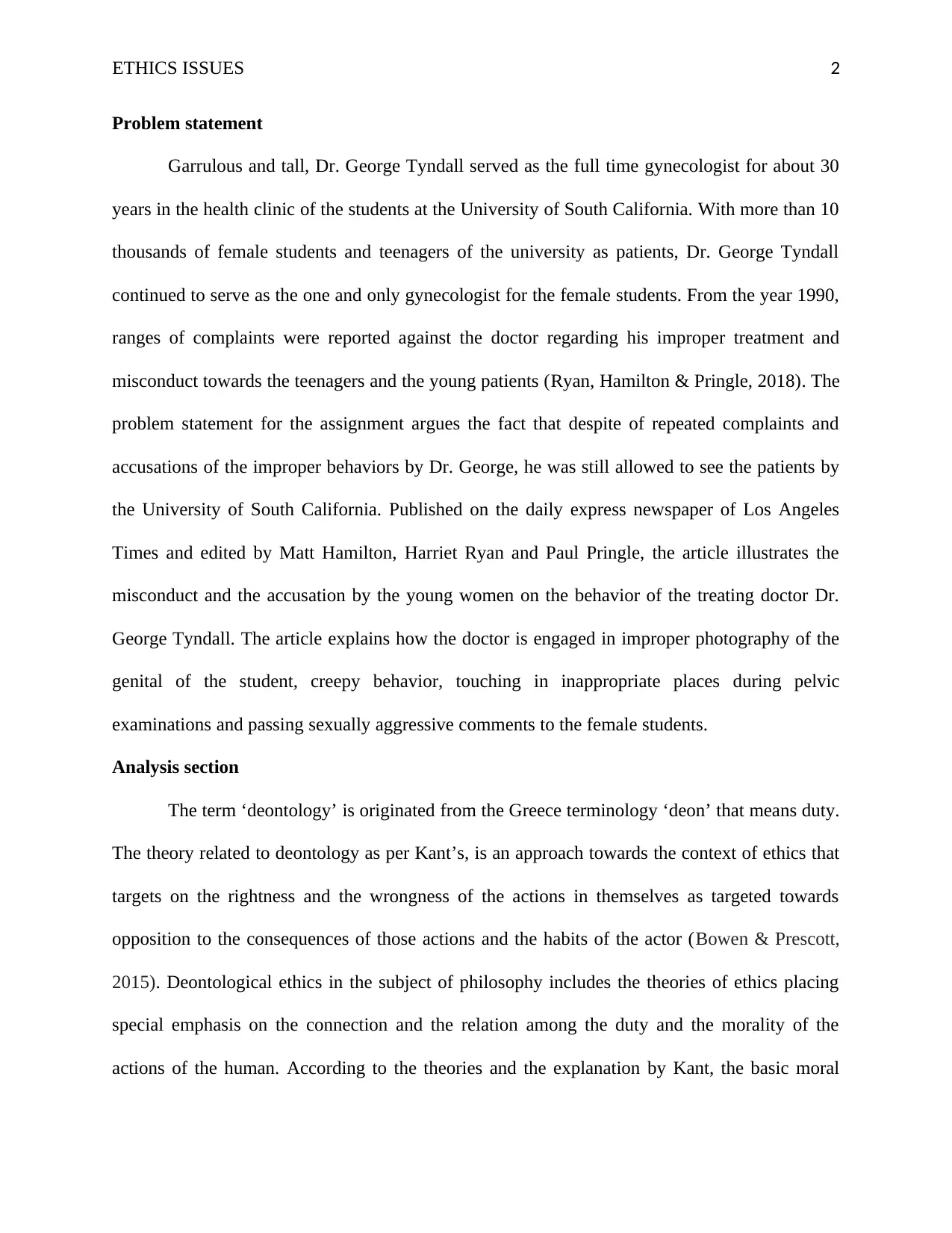
ETHICS ISSUES 2
Problem statement
Garrulous and tall, Dr. George Tyndall served as the full time gynecologist for about 30
years in the health clinic of the students at the University of South California. With more than 10
thousands of female students and teenagers of the university as patients, Dr. George Tyndall
continued to serve as the one and only gynecologist for the female students. From the year 1990,
ranges of complaints were reported against the doctor regarding his improper treatment and
misconduct towards the teenagers and the young patients (Ryan, Hamilton & Pringle, 2018). The
problem statement for the assignment argues the fact that despite of repeated complaints and
accusations of the improper behaviors by Dr. George, he was still allowed to see the patients by
the University of South California. Published on the daily express newspaper of Los Angeles
Times and edited by Matt Hamilton, Harriet Ryan and Paul Pringle, the article illustrates the
misconduct and the accusation by the young women on the behavior of the treating doctor Dr.
George Tyndall. The article explains how the doctor is engaged in improper photography of the
genital of the student, creepy behavior, touching in inappropriate places during pelvic
examinations and passing sexually aggressive comments to the female students.
Analysis section
The term ‘deontology’ is originated from the Greece terminology ‘deon’ that means duty.
The theory related to deontology as per Kant’s, is an approach towards the context of ethics that
targets on the rightness and the wrongness of the actions in themselves as targeted towards
opposition to the consequences of those actions and the habits of the actor (Bowen & Prescott,
2015). Deontological ethics in the subject of philosophy includes the theories of ethics placing
special emphasis on the connection and the relation among the duty and the morality of the
actions of the human. According to the theories and the explanation by Kant, the basic moral
Problem statement
Garrulous and tall, Dr. George Tyndall served as the full time gynecologist for about 30
years in the health clinic of the students at the University of South California. With more than 10
thousands of female students and teenagers of the university as patients, Dr. George Tyndall
continued to serve as the one and only gynecologist for the female students. From the year 1990,
ranges of complaints were reported against the doctor regarding his improper treatment and
misconduct towards the teenagers and the young patients (Ryan, Hamilton & Pringle, 2018). The
problem statement for the assignment argues the fact that despite of repeated complaints and
accusations of the improper behaviors by Dr. George, he was still allowed to see the patients by
the University of South California. Published on the daily express newspaper of Los Angeles
Times and edited by Matt Hamilton, Harriet Ryan and Paul Pringle, the article illustrates the
misconduct and the accusation by the young women on the behavior of the treating doctor Dr.
George Tyndall. The article explains how the doctor is engaged in improper photography of the
genital of the student, creepy behavior, touching in inappropriate places during pelvic
examinations and passing sexually aggressive comments to the female students.
Analysis section
The term ‘deontology’ is originated from the Greece terminology ‘deon’ that means duty.
The theory related to deontology as per Kant’s, is an approach towards the context of ethics that
targets on the rightness and the wrongness of the actions in themselves as targeted towards
opposition to the consequences of those actions and the habits of the actor (Bowen & Prescott,
2015). Deontological ethics in the subject of philosophy includes the theories of ethics placing
special emphasis on the connection and the relation among the duty and the morality of the
actions of the human. According to the theories and the explanation by Kant, the basic moral
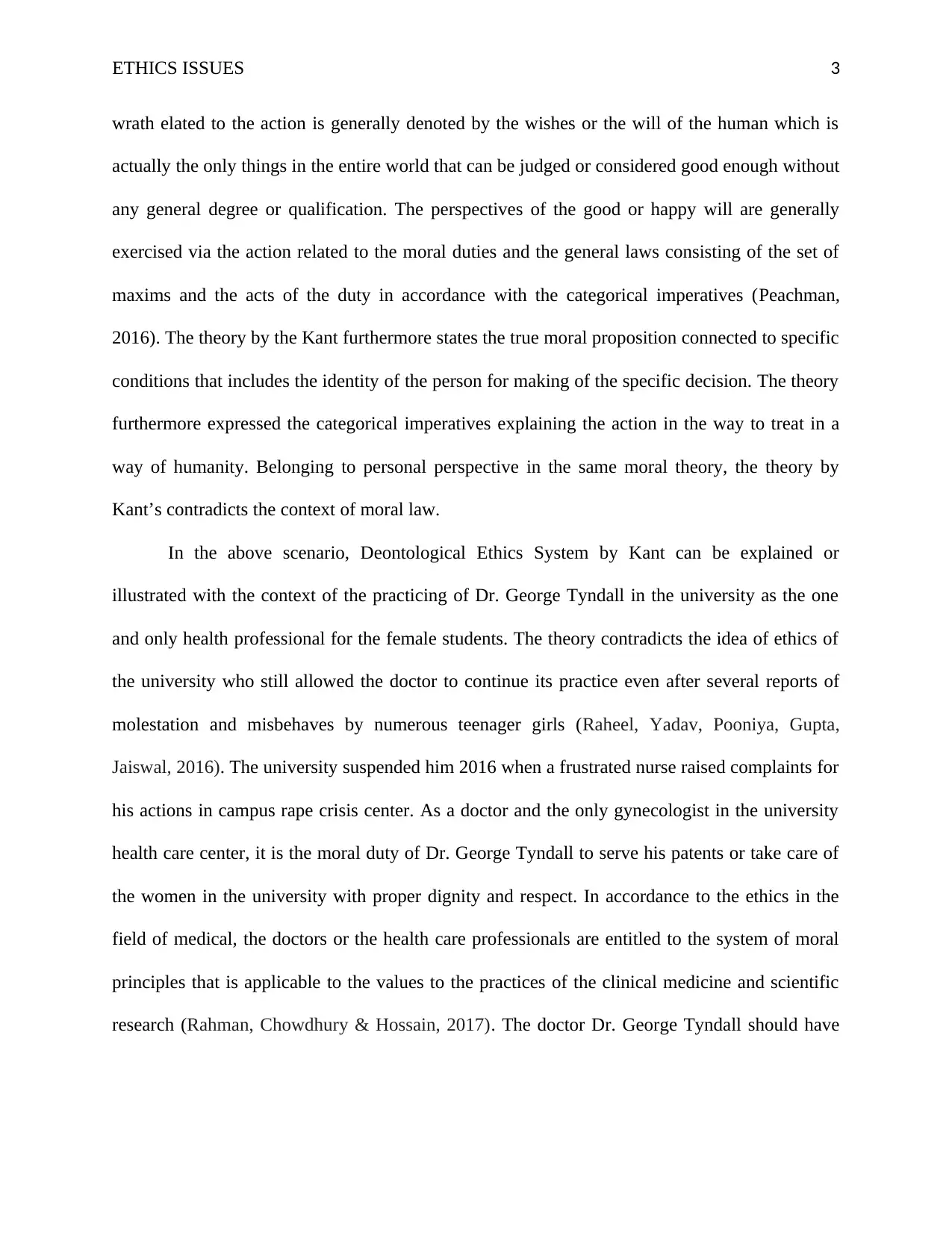
ETHICS ISSUES 3
wrath elated to the action is generally denoted by the wishes or the will of the human which is
actually the only things in the entire world that can be judged or considered good enough without
any general degree or qualification. The perspectives of the good or happy will are generally
exercised via the action related to the moral duties and the general laws consisting of the set of
maxims and the acts of the duty in accordance with the categorical imperatives (Peachman,
2016). The theory by the Kant furthermore states the true moral proposition connected to specific
conditions that includes the identity of the person for making of the specific decision. The theory
furthermore expressed the categorical imperatives explaining the action in the way to treat in a
way of humanity. Belonging to personal perspective in the same moral theory, the theory by
Kant’s contradicts the context of moral law.
In the above scenario, Deontological Ethics System by Kant can be explained or
illustrated with the context of the practicing of Dr. George Tyndall in the university as the one
and only health professional for the female students. The theory contradicts the idea of ethics of
the university who still allowed the doctor to continue its practice even after several reports of
molestation and misbehaves by numerous teenager girls (Raheel, Yadav, Pooniya, Gupta,
Jaiswal, 2016). The university suspended him 2016 when a frustrated nurse raised complaints for
his actions in campus rape crisis center. As a doctor and the only gynecologist in the university
health care center, it is the moral duty of Dr. George Tyndall to serve his patents or take care of
the women in the university with proper dignity and respect. In accordance to the ethics in the
field of medical, the doctors or the health care professionals are entitled to the system of moral
principles that is applicable to the values to the practices of the clinical medicine and scientific
research (Rahman, Chowdhury & Hossain, 2017). The doctor Dr. George Tyndall should have
wrath elated to the action is generally denoted by the wishes or the will of the human which is
actually the only things in the entire world that can be judged or considered good enough without
any general degree or qualification. The perspectives of the good or happy will are generally
exercised via the action related to the moral duties and the general laws consisting of the set of
maxims and the acts of the duty in accordance with the categorical imperatives (Peachman,
2016). The theory by the Kant furthermore states the true moral proposition connected to specific
conditions that includes the identity of the person for making of the specific decision. The theory
furthermore expressed the categorical imperatives explaining the action in the way to treat in a
way of humanity. Belonging to personal perspective in the same moral theory, the theory by
Kant’s contradicts the context of moral law.
In the above scenario, Deontological Ethics System by Kant can be explained or
illustrated with the context of the practicing of Dr. George Tyndall in the university as the one
and only health professional for the female students. The theory contradicts the idea of ethics of
the university who still allowed the doctor to continue its practice even after several reports of
molestation and misbehaves by numerous teenager girls (Raheel, Yadav, Pooniya, Gupta,
Jaiswal, 2016). The university suspended him 2016 when a frustrated nurse raised complaints for
his actions in campus rape crisis center. As a doctor and the only gynecologist in the university
health care center, it is the moral duty of Dr. George Tyndall to serve his patents or take care of
the women in the university with proper dignity and respect. In accordance to the ethics in the
field of medical, the doctors or the health care professionals are entitled to the system of moral
principles that is applicable to the values to the practices of the clinical medicine and scientific
research (Rahman, Chowdhury & Hossain, 2017). The doctor Dr. George Tyndall should have
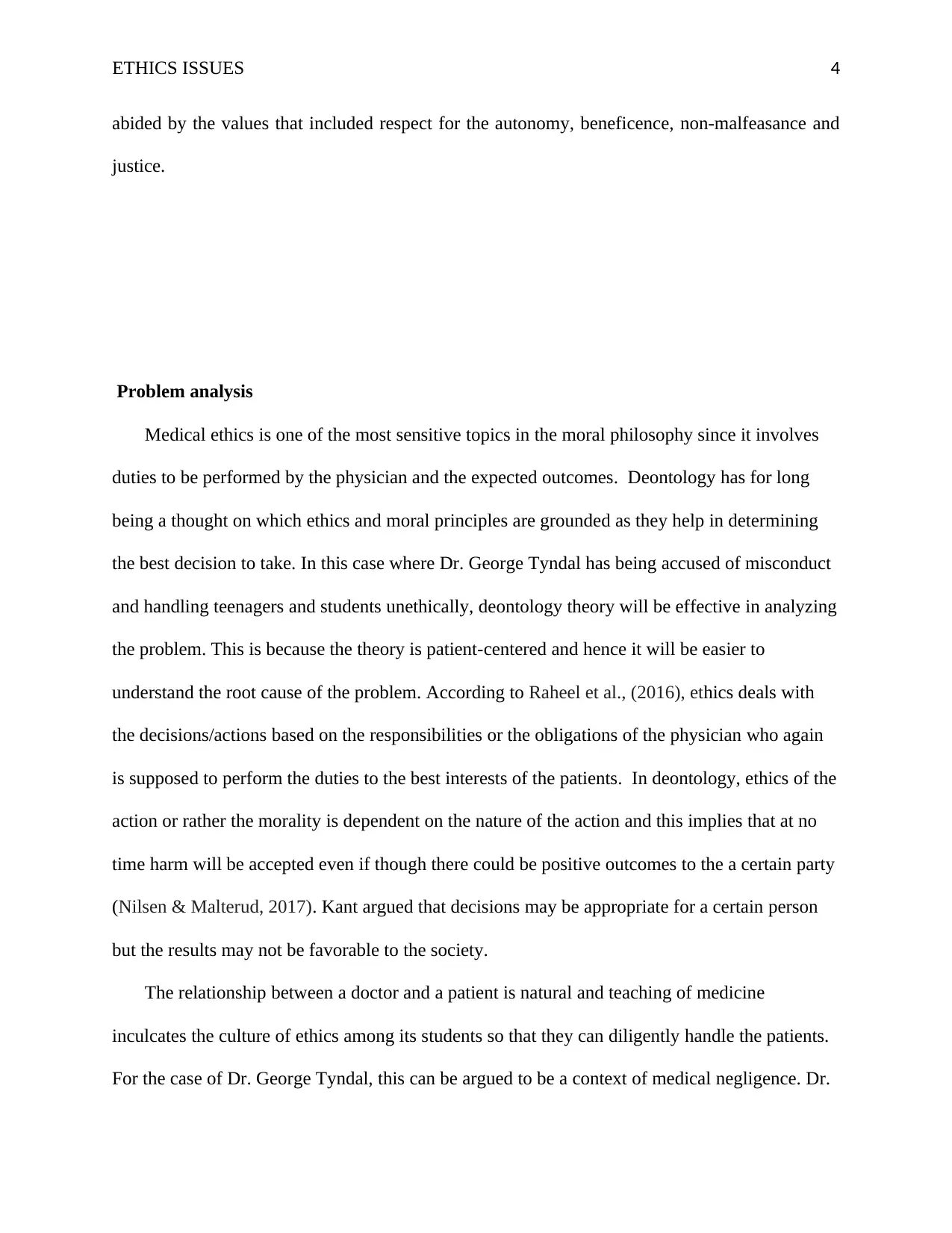
ETHICS ISSUES 4
abided by the values that included respect for the autonomy, beneficence, non-malfeasance and
justice.
Problem analysis
Medical ethics is one of the most sensitive topics in the moral philosophy since it involves
duties to be performed by the physician and the expected outcomes. Deontology has for long
being a thought on which ethics and moral principles are grounded as they help in determining
the best decision to take. In this case where Dr. George Tyndal has being accused of misconduct
and handling teenagers and students unethically, deontology theory will be effective in analyzing
the problem. This is because the theory is patient-centered and hence it will be easier to
understand the root cause of the problem. According to Raheel et al., (2016), ethics deals with
the decisions/actions based on the responsibilities or the obligations of the physician who again
is supposed to perform the duties to the best interests of the patients. In deontology, ethics of the
action or rather the morality is dependent on the nature of the action and this implies that at no
time harm will be accepted even if though there could be positive outcomes to the a certain party
(Nilsen & Malterud, 2017). Kant argued that decisions may be appropriate for a certain person
but the results may not be favorable to the society.
The relationship between a doctor and a patient is natural and teaching of medicine
inculcates the culture of ethics among its students so that they can diligently handle the patients.
For the case of Dr. George Tyndal, this can be argued to be a context of medical negligence. Dr.
abided by the values that included respect for the autonomy, beneficence, non-malfeasance and
justice.
Problem analysis
Medical ethics is one of the most sensitive topics in the moral philosophy since it involves
duties to be performed by the physician and the expected outcomes. Deontology has for long
being a thought on which ethics and moral principles are grounded as they help in determining
the best decision to take. In this case where Dr. George Tyndal has being accused of misconduct
and handling teenagers and students unethically, deontology theory will be effective in analyzing
the problem. This is because the theory is patient-centered and hence it will be easier to
understand the root cause of the problem. According to Raheel et al., (2016), ethics deals with
the decisions/actions based on the responsibilities or the obligations of the physician who again
is supposed to perform the duties to the best interests of the patients. In deontology, ethics of the
action or rather the morality is dependent on the nature of the action and this implies that at no
time harm will be accepted even if though there could be positive outcomes to the a certain party
(Nilsen & Malterud, 2017). Kant argued that decisions may be appropriate for a certain person
but the results may not be favorable to the society.
The relationship between a doctor and a patient is natural and teaching of medicine
inculcates the culture of ethics among its students so that they can diligently handle the patients.
For the case of Dr. George Tyndal, this can be argued to be a context of medical negligence. Dr.
Secure Best Marks with AI Grader
Need help grading? Try our AI Grader for instant feedback on your assignments.
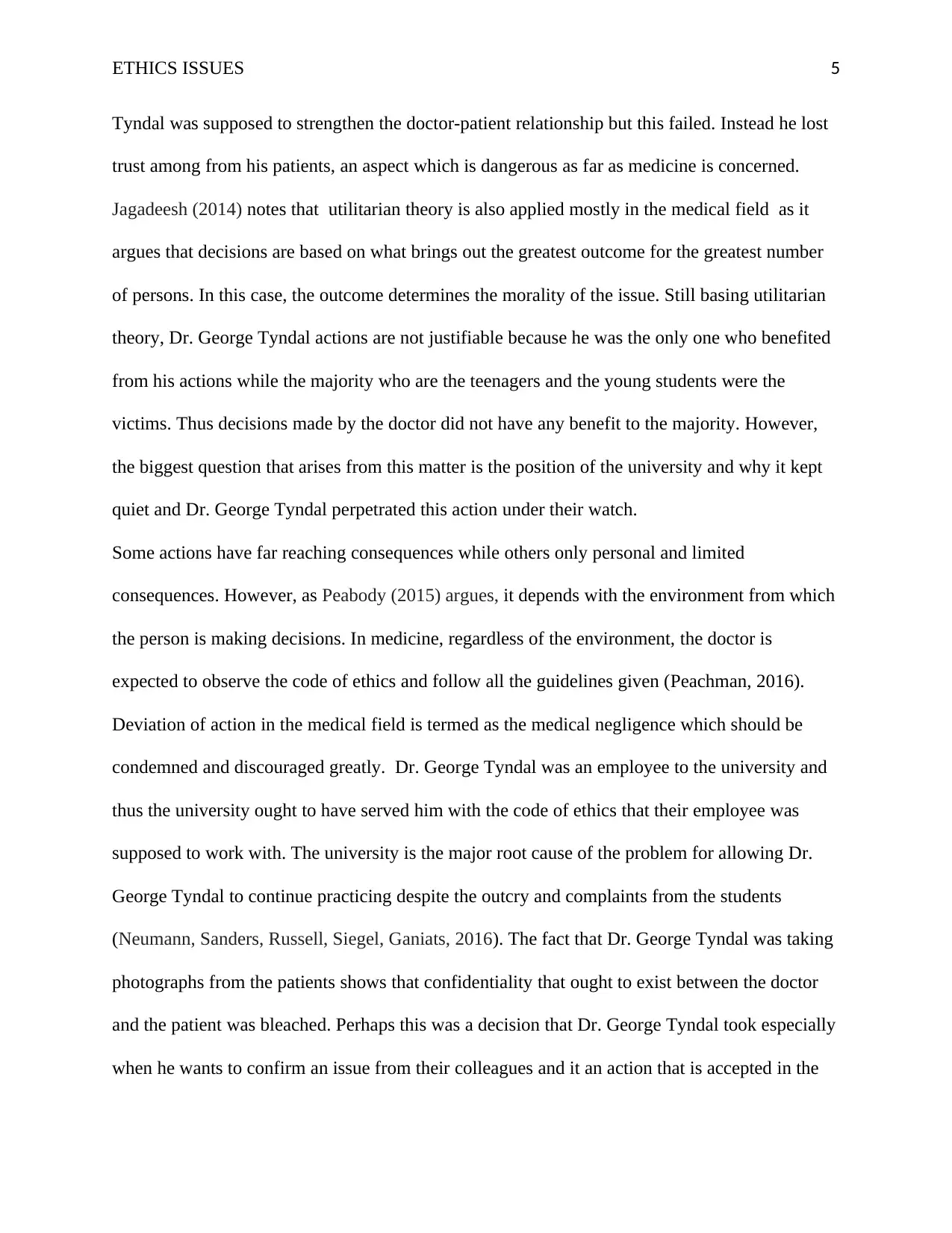
ETHICS ISSUES 5
Tyndal was supposed to strengthen the doctor-patient relationship but this failed. Instead he lost
trust among from his patients, an aspect which is dangerous as far as medicine is concerned.
Jagadeesh (2014) notes that utilitarian theory is also applied mostly in the medical field as it
argues that decisions are based on what brings out the greatest outcome for the greatest number
of persons. In this case, the outcome determines the morality of the issue. Still basing utilitarian
theory, Dr. George Tyndal actions are not justifiable because he was the only one who benefited
from his actions while the majority who are the teenagers and the young students were the
victims. Thus decisions made by the doctor did not have any benefit to the majority. However,
the biggest question that arises from this matter is the position of the university and why it kept
quiet and Dr. George Tyndal perpetrated this action under their watch.
Some actions have far reaching consequences while others only personal and limited
consequences. However, as Peabody (2015) argues, it depends with the environment from which
the person is making decisions. In medicine, regardless of the environment, the doctor is
expected to observe the code of ethics and follow all the guidelines given (Peachman, 2016).
Deviation of action in the medical field is termed as the medical negligence which should be
condemned and discouraged greatly. Dr. George Tyndal was an employee to the university and
thus the university ought to have served him with the code of ethics that their employee was
supposed to work with. The university is the major root cause of the problem for allowing Dr.
George Tyndal to continue practicing despite the outcry and complaints from the students
(Neumann, Sanders, Russell, Siegel, Ganiats, 2016). The fact that Dr. George Tyndal was taking
photographs from the patients shows that confidentiality that ought to exist between the doctor
and the patient was bleached. Perhaps this was a decision that Dr. George Tyndal took especially
when he wants to confirm an issue from their colleagues and it an action that is accepted in the
Tyndal was supposed to strengthen the doctor-patient relationship but this failed. Instead he lost
trust among from his patients, an aspect which is dangerous as far as medicine is concerned.
Jagadeesh (2014) notes that utilitarian theory is also applied mostly in the medical field as it
argues that decisions are based on what brings out the greatest outcome for the greatest number
of persons. In this case, the outcome determines the morality of the issue. Still basing utilitarian
theory, Dr. George Tyndal actions are not justifiable because he was the only one who benefited
from his actions while the majority who are the teenagers and the young students were the
victims. Thus decisions made by the doctor did not have any benefit to the majority. However,
the biggest question that arises from this matter is the position of the university and why it kept
quiet and Dr. George Tyndal perpetrated this action under their watch.
Some actions have far reaching consequences while others only personal and limited
consequences. However, as Peabody (2015) argues, it depends with the environment from which
the person is making decisions. In medicine, regardless of the environment, the doctor is
expected to observe the code of ethics and follow all the guidelines given (Peachman, 2016).
Deviation of action in the medical field is termed as the medical negligence which should be
condemned and discouraged greatly. Dr. George Tyndal was an employee to the university and
thus the university ought to have served him with the code of ethics that their employee was
supposed to work with. The university is the major root cause of the problem for allowing Dr.
George Tyndal to continue practicing despite the outcry and complaints from the students
(Neumann, Sanders, Russell, Siegel, Ganiats, 2016). The fact that Dr. George Tyndal was taking
photographs from the patients shows that confidentiality that ought to exist between the doctor
and the patient was bleached. Perhaps this was a decision that Dr. George Tyndal took especially
when he wants to confirm an issue from their colleagues and it an action that is accepted in the
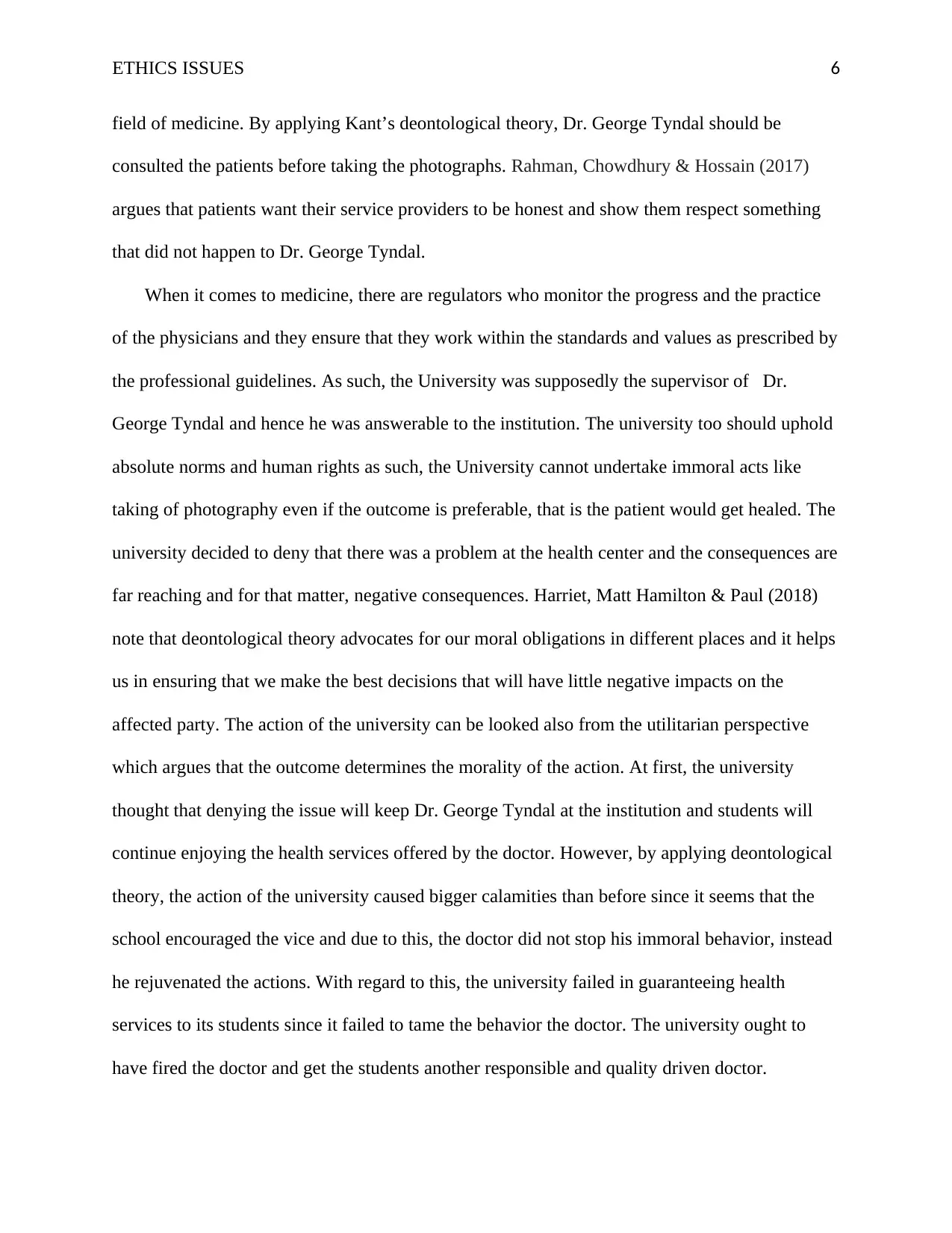
ETHICS ISSUES 6
field of medicine. By applying Kant’s deontological theory, Dr. George Tyndal should be
consulted the patients before taking the photographs. Rahman, Chowdhury & Hossain (2017)
argues that patients want their service providers to be honest and show them respect something
that did not happen to Dr. George Tyndal.
When it comes to medicine, there are regulators who monitor the progress and the practice
of the physicians and they ensure that they work within the standards and values as prescribed by
the professional guidelines. As such, the University was supposedly the supervisor of Dr.
George Tyndal and hence he was answerable to the institution. The university too should uphold
absolute norms and human rights as such, the University cannot undertake immoral acts like
taking of photography even if the outcome is preferable, that is the patient would get healed. The
university decided to deny that there was a problem at the health center and the consequences are
far reaching and for that matter, negative consequences. Harriet, Matt Hamilton & Paul (2018)
note that deontological theory advocates for our moral obligations in different places and it helps
us in ensuring that we make the best decisions that will have little negative impacts on the
affected party. The action of the university can be looked also from the utilitarian perspective
which argues that the outcome determines the morality of the action. At first, the university
thought that denying the issue will keep Dr. George Tyndal at the institution and students will
continue enjoying the health services offered by the doctor. However, by applying deontological
theory, the action of the university caused bigger calamities than before since it seems that the
school encouraged the vice and due to this, the doctor did not stop his immoral behavior, instead
he rejuvenated the actions. With regard to this, the university failed in guaranteeing health
services to its students since it failed to tame the behavior the doctor. The university ought to
have fired the doctor and get the students another responsible and quality driven doctor.
field of medicine. By applying Kant’s deontological theory, Dr. George Tyndal should be
consulted the patients before taking the photographs. Rahman, Chowdhury & Hossain (2017)
argues that patients want their service providers to be honest and show them respect something
that did not happen to Dr. George Tyndal.
When it comes to medicine, there are regulators who monitor the progress and the practice
of the physicians and they ensure that they work within the standards and values as prescribed by
the professional guidelines. As such, the University was supposedly the supervisor of Dr.
George Tyndal and hence he was answerable to the institution. The university too should uphold
absolute norms and human rights as such, the University cannot undertake immoral acts like
taking of photography even if the outcome is preferable, that is the patient would get healed. The
university decided to deny that there was a problem at the health center and the consequences are
far reaching and for that matter, negative consequences. Harriet, Matt Hamilton & Paul (2018)
note that deontological theory advocates for our moral obligations in different places and it helps
us in ensuring that we make the best decisions that will have little negative impacts on the
affected party. The action of the university can be looked also from the utilitarian perspective
which argues that the outcome determines the morality of the action. At first, the university
thought that denying the issue will keep Dr. George Tyndal at the institution and students will
continue enjoying the health services offered by the doctor. However, by applying deontological
theory, the action of the university caused bigger calamities than before since it seems that the
school encouraged the vice and due to this, the doctor did not stop his immoral behavior, instead
he rejuvenated the actions. With regard to this, the university failed in guaranteeing health
services to its students since it failed to tame the behavior the doctor. The university ought to
have fired the doctor and get the students another responsible and quality driven doctor.
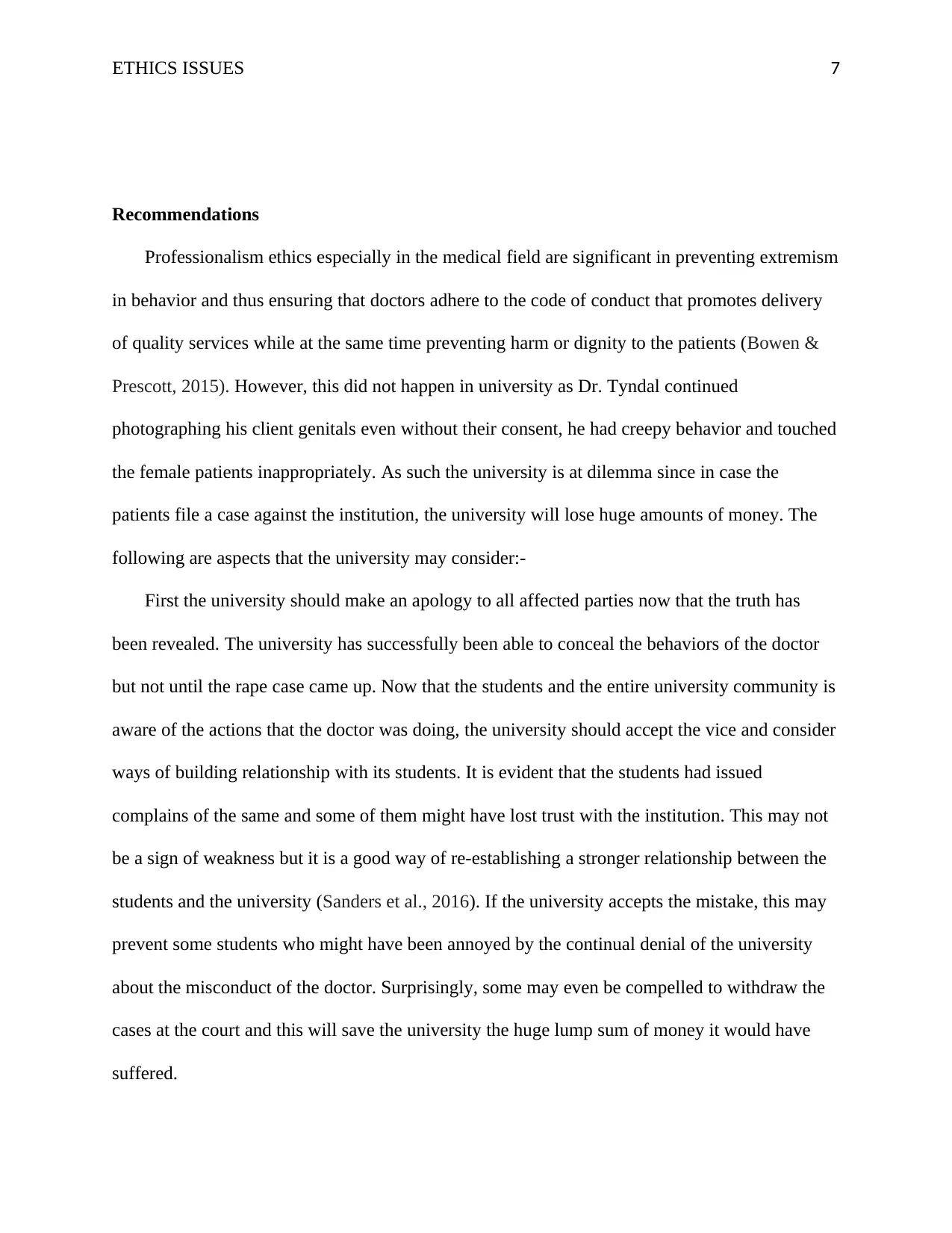
ETHICS ISSUES 7
Recommendations
Professionalism ethics especially in the medical field are significant in preventing extremism
in behavior and thus ensuring that doctors adhere to the code of conduct that promotes delivery
of quality services while at the same time preventing harm or dignity to the patients (Bowen &
Prescott, 2015). However, this did not happen in university as Dr. Tyndal continued
photographing his client genitals even without their consent, he had creepy behavior and touched
the female patients inappropriately. As such the university is at dilemma since in case the
patients file a case against the institution, the university will lose huge amounts of money. The
following are aspects that the university may consider:-
First the university should make an apology to all affected parties now that the truth has
been revealed. The university has successfully been able to conceal the behaviors of the doctor
but not until the rape case came up. Now that the students and the entire university community is
aware of the actions that the doctor was doing, the university should accept the vice and consider
ways of building relationship with its students. It is evident that the students had issued
complains of the same and some of them might have lost trust with the institution. This may not
be a sign of weakness but it is a good way of re-establishing a stronger relationship between the
students and the university (Sanders et al., 2016). If the university accepts the mistake, this may
prevent some students who might have been annoyed by the continual denial of the university
about the misconduct of the doctor. Surprisingly, some may even be compelled to withdraw the
cases at the court and this will save the university the huge lump sum of money it would have
suffered.
Recommendations
Professionalism ethics especially in the medical field are significant in preventing extremism
in behavior and thus ensuring that doctors adhere to the code of conduct that promotes delivery
of quality services while at the same time preventing harm or dignity to the patients (Bowen &
Prescott, 2015). However, this did not happen in university as Dr. Tyndal continued
photographing his client genitals even without their consent, he had creepy behavior and touched
the female patients inappropriately. As such the university is at dilemma since in case the
patients file a case against the institution, the university will lose huge amounts of money. The
following are aspects that the university may consider:-
First the university should make an apology to all affected parties now that the truth has
been revealed. The university has successfully been able to conceal the behaviors of the doctor
but not until the rape case came up. Now that the students and the entire university community is
aware of the actions that the doctor was doing, the university should accept the vice and consider
ways of building relationship with its students. It is evident that the students had issued
complains of the same and some of them might have lost trust with the institution. This may not
be a sign of weakness but it is a good way of re-establishing a stronger relationship between the
students and the university (Sanders et al., 2016). If the university accepts the mistake, this may
prevent some students who might have been annoyed by the continual denial of the university
about the misconduct of the doctor. Surprisingly, some may even be compelled to withdraw the
cases at the court and this will save the university the huge lump sum of money it would have
suffered.
Paraphrase This Document
Need a fresh take? Get an instant paraphrase of this document with our AI Paraphraser
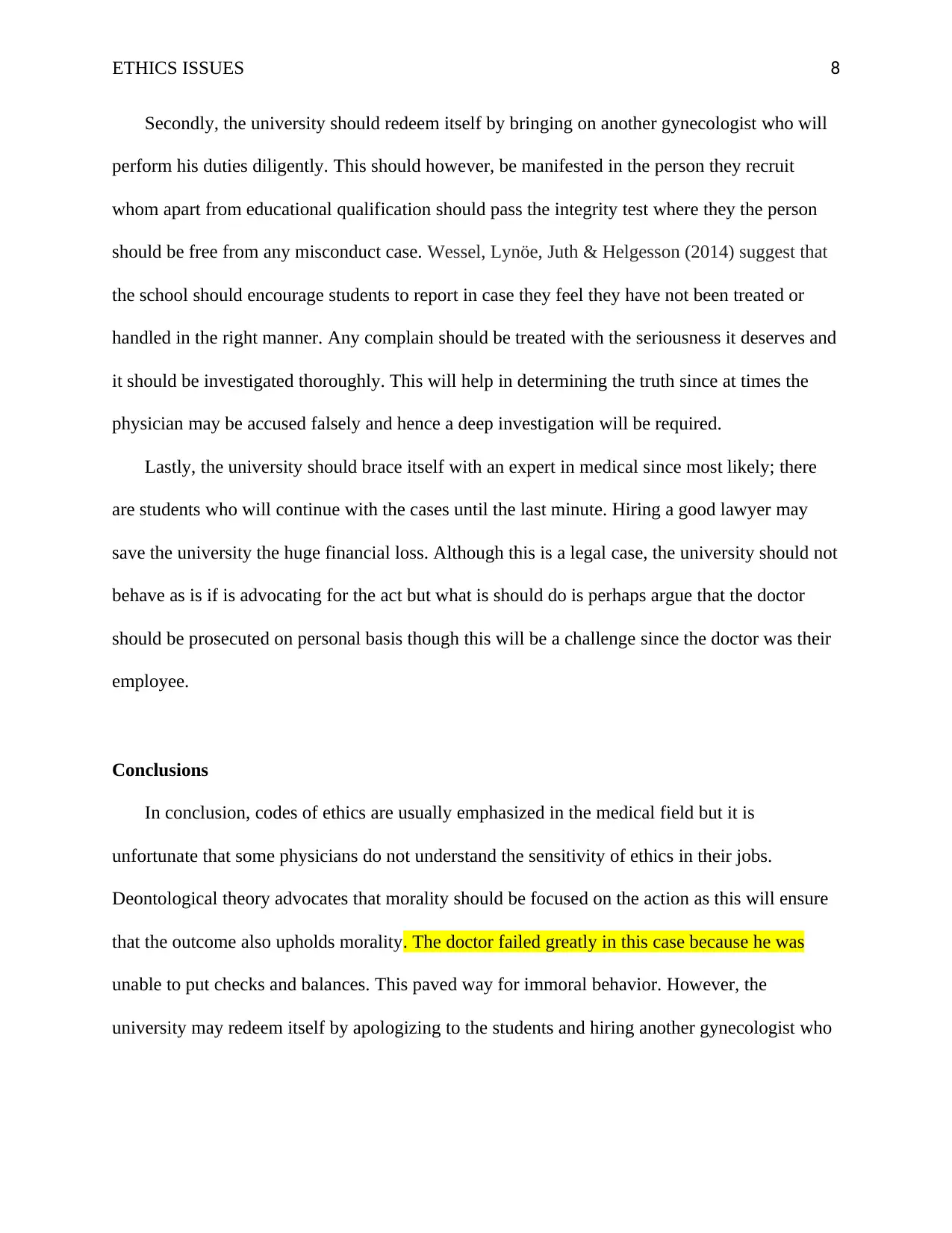
ETHICS ISSUES 8
Secondly, the university should redeem itself by bringing on another gynecologist who will
perform his duties diligently. This should however, be manifested in the person they recruit
whom apart from educational qualification should pass the integrity test where they the person
should be free from any misconduct case. Wessel, Lynöe, Juth & Helgesson (2014) suggest that
the school should encourage students to report in case they feel they have not been treated or
handled in the right manner. Any complain should be treated with the seriousness it deserves and
it should be investigated thoroughly. This will help in determining the truth since at times the
physician may be accused falsely and hence a deep investigation will be required.
Lastly, the university should brace itself with an expert in medical since most likely; there
are students who will continue with the cases until the last minute. Hiring a good lawyer may
save the university the huge financial loss. Although this is a legal case, the university should not
behave as is if is advocating for the act but what is should do is perhaps argue that the doctor
should be prosecuted on personal basis though this will be a challenge since the doctor was their
employee.
Conclusions
In conclusion, codes of ethics are usually emphasized in the medical field but it is
unfortunate that some physicians do not understand the sensitivity of ethics in their jobs.
Deontological theory advocates that morality should be focused on the action as this will ensure
that the outcome also upholds morality. The doctor failed greatly in this case because he was
unable to put checks and balances. This paved way for immoral behavior. However, the
university may redeem itself by apologizing to the students and hiring another gynecologist who
Secondly, the university should redeem itself by bringing on another gynecologist who will
perform his duties diligently. This should however, be manifested in the person they recruit
whom apart from educational qualification should pass the integrity test where they the person
should be free from any misconduct case. Wessel, Lynöe, Juth & Helgesson (2014) suggest that
the school should encourage students to report in case they feel they have not been treated or
handled in the right manner. Any complain should be treated with the seriousness it deserves and
it should be investigated thoroughly. This will help in determining the truth since at times the
physician may be accused falsely and hence a deep investigation will be required.
Lastly, the university should brace itself with an expert in medical since most likely; there
are students who will continue with the cases until the last minute. Hiring a good lawyer may
save the university the huge financial loss. Although this is a legal case, the university should not
behave as is if is advocating for the act but what is should do is perhaps argue that the doctor
should be prosecuted on personal basis though this will be a challenge since the doctor was their
employee.
Conclusions
In conclusion, codes of ethics are usually emphasized in the medical field but it is
unfortunate that some physicians do not understand the sensitivity of ethics in their jobs.
Deontological theory advocates that morality should be focused on the action as this will ensure
that the outcome also upholds morality. The doctor failed greatly in this case because he was
unable to put checks and balances. This paved way for immoral behavior. However, the
university may redeem itself by apologizing to the students and hiring another gynecologist who
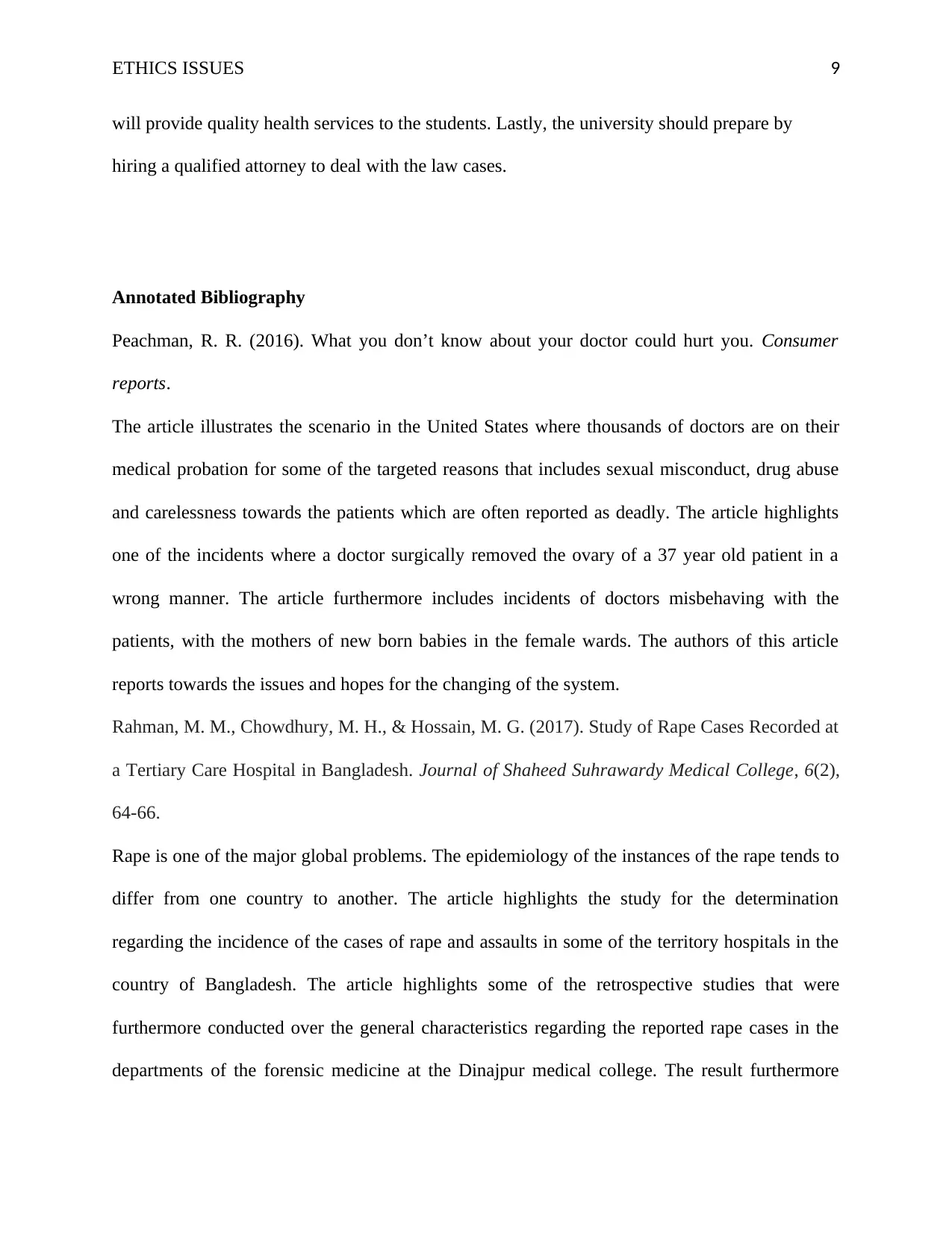
ETHICS ISSUES 9
will provide quality health services to the students. Lastly, the university should prepare by
hiring a qualified attorney to deal with the law cases.
Annotated Bibliography
Peachman, R. R. (2016). What you don’t know about your doctor could hurt you. Consumer
reports.
The article illustrates the scenario in the United States where thousands of doctors are on their
medical probation for some of the targeted reasons that includes sexual misconduct, drug abuse
and carelessness towards the patients which are often reported as deadly. The article highlights
one of the incidents where a doctor surgically removed the ovary of a 37 year old patient in a
wrong manner. The article furthermore includes incidents of doctors misbehaving with the
patients, with the mothers of new born babies in the female wards. The authors of this article
reports towards the issues and hopes for the changing of the system.
Rahman, M. M., Chowdhury, M. H., & Hossain, M. G. (2017). Study of Rape Cases Recorded at
a Tertiary Care Hospital in Bangladesh. Journal of Shaheed Suhrawardy Medical College, 6(2),
64-66.
Rape is one of the major global problems. The epidemiology of the instances of the rape tends to
differ from one country to another. The article highlights the study for the determination
regarding the incidence of the cases of rape and assaults in some of the territory hospitals in the
country of Bangladesh. The article highlights some of the retrospective studies that were
furthermore conducted over the general characteristics regarding the reported rape cases in the
departments of the forensic medicine at the Dinajpur medical college. The result furthermore
will provide quality health services to the students. Lastly, the university should prepare by
hiring a qualified attorney to deal with the law cases.
Annotated Bibliography
Peachman, R. R. (2016). What you don’t know about your doctor could hurt you. Consumer
reports.
The article illustrates the scenario in the United States where thousands of doctors are on their
medical probation for some of the targeted reasons that includes sexual misconduct, drug abuse
and carelessness towards the patients which are often reported as deadly. The article highlights
one of the incidents where a doctor surgically removed the ovary of a 37 year old patient in a
wrong manner. The article furthermore includes incidents of doctors misbehaving with the
patients, with the mothers of new born babies in the female wards. The authors of this article
reports towards the issues and hopes for the changing of the system.
Rahman, M. M., Chowdhury, M. H., & Hossain, M. G. (2017). Study of Rape Cases Recorded at
a Tertiary Care Hospital in Bangladesh. Journal of Shaheed Suhrawardy Medical College, 6(2),
64-66.
Rape is one of the major global problems. The epidemiology of the instances of the rape tends to
differ from one country to another. The article highlights the study for the determination
regarding the incidence of the cases of rape and assaults in some of the territory hospitals in the
country of Bangladesh. The article highlights some of the retrospective studies that were
furthermore conducted over the general characteristics regarding the reported rape cases in the
departments of the forensic medicine at the Dinajpur medical college. The result furthermore
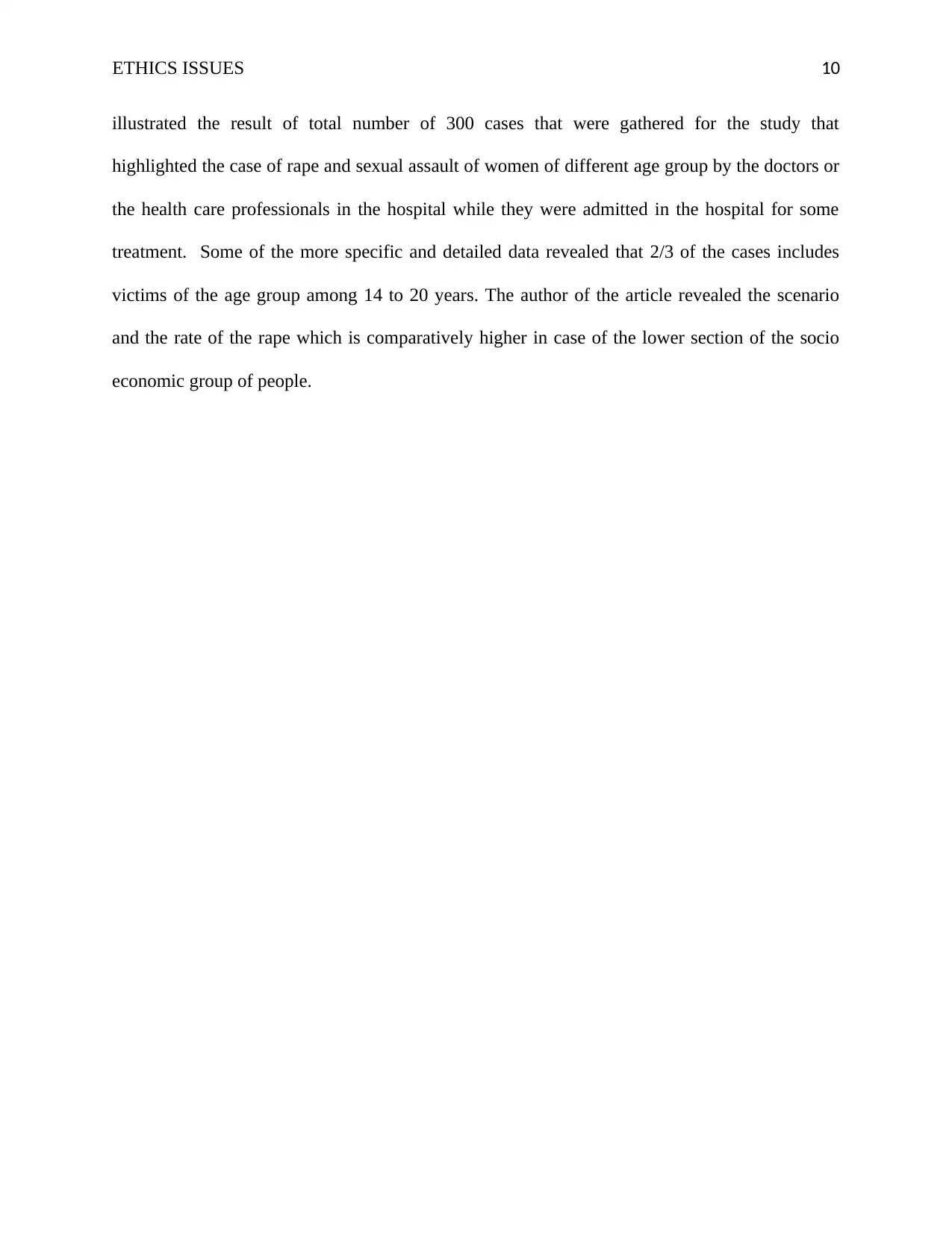
ETHICS ISSUES 10
illustrated the result of total number of 300 cases that were gathered for the study that
highlighted the case of rape and sexual assault of women of different age group by the doctors or
the health care professionals in the hospital while they were admitted in the hospital for some
treatment. Some of the more specific and detailed data revealed that 2/3 of the cases includes
victims of the age group among 14 to 20 years. The author of the article revealed the scenario
and the rate of the rape which is comparatively higher in case of the lower section of the socio
economic group of people.
illustrated the result of total number of 300 cases that were gathered for the study that
highlighted the case of rape and sexual assault of women of different age group by the doctors or
the health care professionals in the hospital while they were admitted in the hospital for some
treatment. Some of the more specific and detailed data revealed that 2/3 of the cases includes
victims of the age group among 14 to 20 years. The author of the article revealed the scenario
and the rate of the rape which is comparatively higher in case of the lower section of the socio
economic group of people.
Secure Best Marks with AI Grader
Need help grading? Try our AI Grader for instant feedback on your assignments.
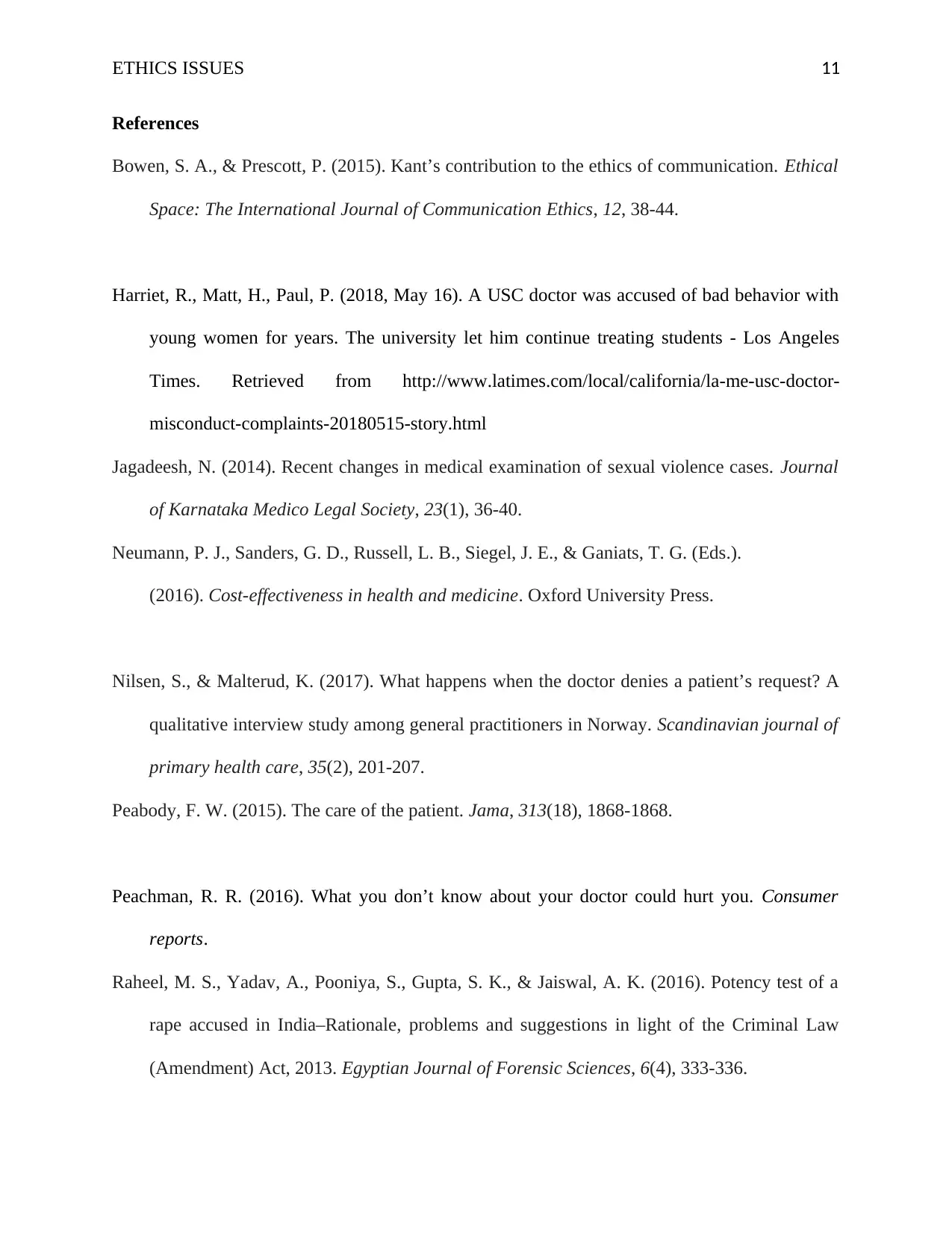
ETHICS ISSUES 11
References
Bowen, S. A., & Prescott, P. (2015). Kant’s contribution to the ethics of communication. Ethical
Space: The International Journal of Communication Ethics, 12, 38-44.
Harriet, R., Matt, H., Paul, P. (2018, May 16). A USC doctor was accused of bad behavior with
young women for years. The university let him continue treating students - Los Angeles
Times. Retrieved from http://www.latimes.com/local/california/la-me-usc-doctor-
misconduct-complaints-20180515-story.html
Jagadeesh, N. (2014). Recent changes in medical examination of sexual violence cases. Journal
of Karnataka Medico Legal Society, 23(1), 36-40.
Neumann, P. J., Sanders, G. D., Russell, L. B., Siegel, J. E., & Ganiats, T. G. (Eds.).
(2016). Cost-effectiveness in health and medicine. Oxford University Press.
Nilsen, S., & Malterud, K. (2017). What happens when the doctor denies a patient’s request? A
qualitative interview study among general practitioners in Norway. Scandinavian journal of
primary health care, 35(2), 201-207.
Peabody, F. W. (2015). The care of the patient. Jama, 313(18), 1868-1868.
Peachman, R. R. (2016). What you don’t know about your doctor could hurt you. Consumer
reports.
Raheel, M. S., Yadav, A., Pooniya, S., Gupta, S. K., & Jaiswal, A. K. (2016). Potency test of a
rape accused in India–Rationale, problems and suggestions in light of the Criminal Law
(Amendment) Act, 2013. Egyptian Journal of Forensic Sciences, 6(4), 333-336.
References
Bowen, S. A., & Prescott, P. (2015). Kant’s contribution to the ethics of communication. Ethical
Space: The International Journal of Communication Ethics, 12, 38-44.
Harriet, R., Matt, H., Paul, P. (2018, May 16). A USC doctor was accused of bad behavior with
young women for years. The university let him continue treating students - Los Angeles
Times. Retrieved from http://www.latimes.com/local/california/la-me-usc-doctor-
misconduct-complaints-20180515-story.html
Jagadeesh, N. (2014). Recent changes in medical examination of sexual violence cases. Journal
of Karnataka Medico Legal Society, 23(1), 36-40.
Neumann, P. J., Sanders, G. D., Russell, L. B., Siegel, J. E., & Ganiats, T. G. (Eds.).
(2016). Cost-effectiveness in health and medicine. Oxford University Press.
Nilsen, S., & Malterud, K. (2017). What happens when the doctor denies a patient’s request? A
qualitative interview study among general practitioners in Norway. Scandinavian journal of
primary health care, 35(2), 201-207.
Peabody, F. W. (2015). The care of the patient. Jama, 313(18), 1868-1868.
Peachman, R. R. (2016). What you don’t know about your doctor could hurt you. Consumer
reports.
Raheel, M. S., Yadav, A., Pooniya, S., Gupta, S. K., & Jaiswal, A. K. (2016). Potency test of a
rape accused in India–Rationale, problems and suggestions in light of the Criminal Law
(Amendment) Act, 2013. Egyptian Journal of Forensic Sciences, 6(4), 333-336.
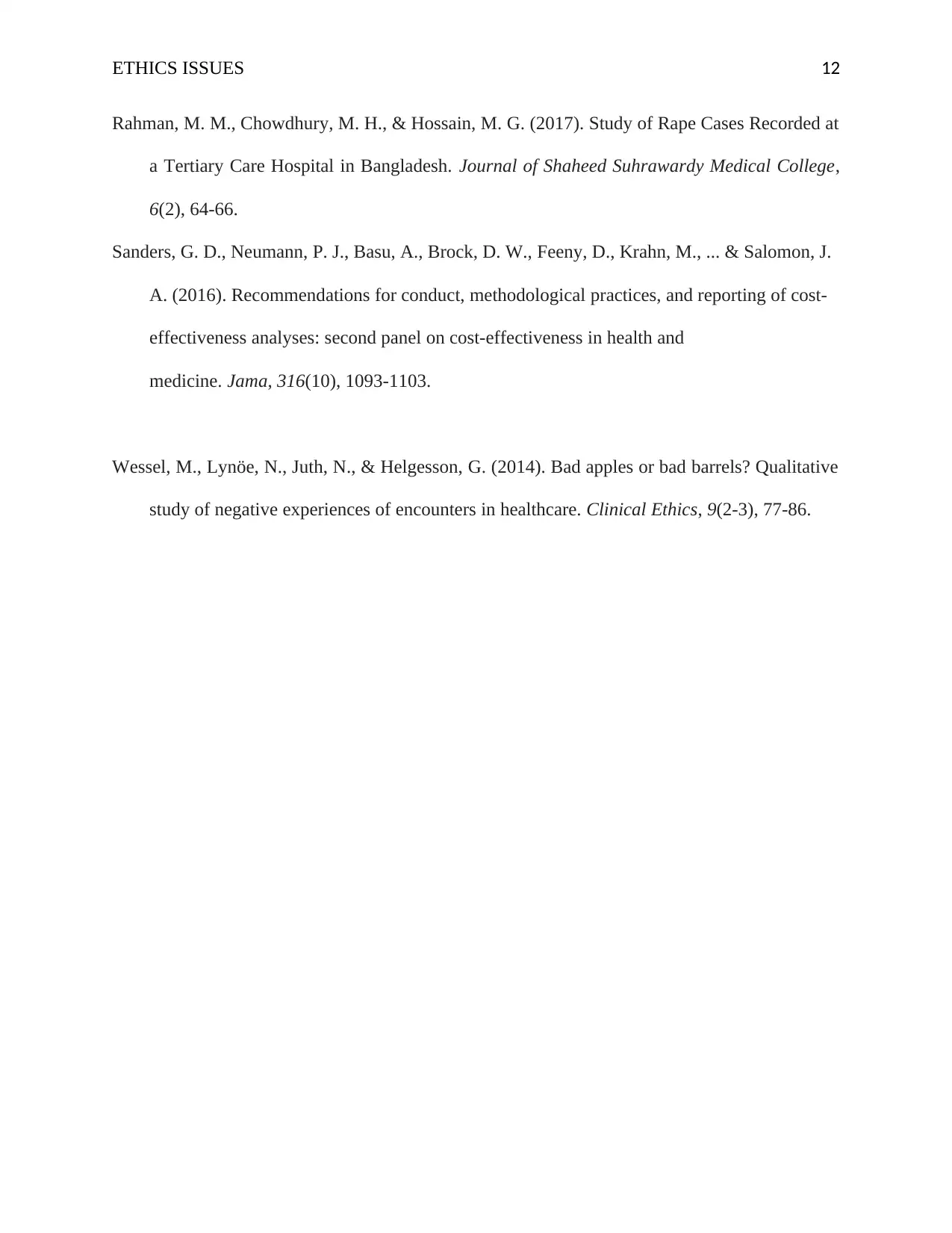
ETHICS ISSUES 12
Rahman, M. M., Chowdhury, M. H., & Hossain, M. G. (2017). Study of Rape Cases Recorded at
a Tertiary Care Hospital in Bangladesh. Journal of Shaheed Suhrawardy Medical College,
6(2), 64-66.
Sanders, G. D., Neumann, P. J., Basu, A., Brock, D. W., Feeny, D., Krahn, M., ... & Salomon, J.
A. (2016). Recommendations for conduct, methodological practices, and reporting of cost-
effectiveness analyses: second panel on cost-effectiveness in health and
medicine. Jama, 316(10), 1093-1103.
Wessel, M., Lynöe, N., Juth, N., & Helgesson, G. (2014). Bad apples or bad barrels? Qualitative
study of negative experiences of encounters in healthcare. Clinical Ethics, 9(2-3), 77-86.
Rahman, M. M., Chowdhury, M. H., & Hossain, M. G. (2017). Study of Rape Cases Recorded at
a Tertiary Care Hospital in Bangladesh. Journal of Shaheed Suhrawardy Medical College,
6(2), 64-66.
Sanders, G. D., Neumann, P. J., Basu, A., Brock, D. W., Feeny, D., Krahn, M., ... & Salomon, J.
A. (2016). Recommendations for conduct, methodological practices, and reporting of cost-
effectiveness analyses: second panel on cost-effectiveness in health and
medicine. Jama, 316(10), 1093-1103.
Wessel, M., Lynöe, N., Juth, N., & Helgesson, G. (2014). Bad apples or bad barrels? Qualitative
study of negative experiences of encounters in healthcare. Clinical Ethics, 9(2-3), 77-86.
1 out of 12
Your All-in-One AI-Powered Toolkit for Academic Success.
+13062052269
info@desklib.com
Available 24*7 on WhatsApp / Email
![[object Object]](/_next/static/media/star-bottom.7253800d.svg)
Unlock your academic potential
© 2024 | Zucol Services PVT LTD | All rights reserved.
